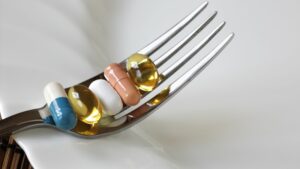Dietary Supplements: Covid Increased the Use

A new survey conducted by The Harris Poll on behalf of the Samueli Foundation found that 29 percent of Americans are taking more supplements compared with before the COVID-19 pandemic, bringing the nationwide percentage of supplement-takers to 76 percent.
While America has always been a pioneer when it comes to taking nutritional supplements, the European population has been hesitant. But according to the latest surveys recently published by the Federal Statistical Office (Destatis), the pandemic has also boosted consumption here: Instead of the 180,200 tons of supplements from 2020, almost 11 percent more were produced this year in Germany alone. According to the “Statista Global Consumer Survey”, only 30 percent of Germans do not take any dietary supplements today.
Preventive intake
In Corona times, the fear of illness has increased – to the advantage of the manufacturers of pills, powders, shots and other nutricosmetics. While many companies were in dire straits, they benefited from increased consumer interest. Werner Baumann, head of the Bayer Group, confirmed that the demand “for certain nutritional supplements that support health is currently three to five times as high as usual”.
Similar in the USA: The results showed that nearly two-thirds of those who increased supplement use (65%) cited a desire to enhance their overall immunity (57%) or protection from COVID-19 (36%) as reasons for the spike. Other reasons for the increase included taking control of their own health (42%), improving sleep (41%), and improving their mental health (34%). The survey also found that vitamins/minerals are the most commonly consumed supplement category, consistent with the previous surveys.
Once a customer, always a customer. Supplement users are loyal. Most buy again and again. Often there is a not inconsiderable psychological effect behind it. Because if you take the products for a while, you quickly get a guilty conscience when you stop using them. You wonder what would have happened if you hadn’t taken it. Would you be less healthy then? So we continue to swallow. The effect you think you can feel with supplements, like firmer nails or stronger hair, is often not really there, but you just feel better with it. After all, the placebo effect, which definitely brings verifiable results, is a not unknown phenomenon.
Do I even need nutritional supplements?
You shouldn’t rely on advertising alone, what the pills can do for you. If you think you need a dietary supplement or want to try a certain product, you should at least talk to a specialist beforehand about whether it also fits your personal health profile. This can be a doctor, a nutritionist or a specialist pharmacist with the additional qualification of nutritional advice. Because the right dosage is very important and that you do not throw in beauty or health pills and combine them with each other at random. But less than half of Americans who use supplements (47%) said they spoke with a health care provider before use, despite national guidelines that strongly recommend doing so.
You should know that too: Additional results showed that more than half of those surveyed taking supplements (52%) mistakenly believe that most dietary supplements available for purchase have been declared safe and effective by the FDA. Approximately 32% indicated that if a supplement could be dangerous, it would not be allowed to be sold in the United States. Whatever many believe, the FDA does not regulate supplements. In fact, many supplements are not identified as dangerous until after people have had negative experiences with it. There is no doubt that some people benefit from dietary supplements, but there are also risks involved. It is all the more important to discuss it with your health care provider first before taking any dietary supplement.
When do I take which supplements?
The time of day for taking supplements is not unimportant, because drugs that make you fit would lead to sleep disorders in the evening. These include, for example, Rhodiola Rosea – also known as rose root -, a stress killer and natural antidepressant. A high-dose vitamin B complex is also more likely to be stimulating. Vitamin D stimulates serotonin (a feel-good neurotransmitter) and can therefore lower the sleep hormone melatonin in the evening.
Vitamin C, magnesium and L-tryptophan, on the other hand, have a calming effect and are easy to take in the evening. Zinc should also be included in the evening plan because it is better tolerated and absorbed. Consume probiotic food supplements right before bed and without a meal. Otherwise, digestive enzymes and stomach acids could reduce the effect.
Generally speaking, it is best to take supplements during the day. Then the body can use them optimally because the metabolism is running at full speed. If you have a sensitive stomach, combine it with a meal, as it can lead to stomach problems on an empty stomach. The fat-soluble vitamins A, D, E, K and omega-3 need fat so that they can be optimally processed, so always swallow with food. Even minimal amounts of fat are sufficient, as they are in an oily salad dressing or a vegetable dish that has been prepared with a little oil.
The mineral calcium should also be taken with food, because its absorption depends on sufficient stomach acid. Iron supplements should preferably be swallowed on an empty stomach or, if necessary, 1-2 hours after a meal. Again, not on an empty stomach, but rather to eat, include concentrated fiber such as oat bran, pectin, psyllium and konjac powder, healing earths in general and alpha lipoic acid. Always drink plenty of water with fiber. Basically, dietary supplements should not be washed down with tea, coffee or milk. Such drinks can hinder the absorption of vital substances.
Who gets along with whom?
In general, supplements can be easily combined with one another. After all, a meal also consists of various vital substances. With some preparations, there are also synergy effects such as the combination of iron with vitamin C, it significantly improves the utilization of iron. Vitamin D can only be converted into its active form by the organism when magnesium is involved. It is similar with turmeric and piperine. The extract from the black pepper ensures that the inflammation-reducing turmeric can be absorbed up to 20 times better.
Alpha-lipoic acid is one of the substances that cannot be combined: its job is to bind heavy metals. If you take them together with a metal such as B. zinc, it also binds this. That doesn’t just mean that you won’t benefit from zinc intake. At the same time, the alpha lipoic acid has less power to bind heavy metals. It is therefore advisable to take about 30 minutes at different times. And not only at a distance from other preparations, but also from meals, as they also contain metallic trace elements. You should also keep your distance when using magnesium and calcium. In high doses (e.g. 300 mg magnesium and 1000 mg calcium), both minerals can affect each other when absorbed in the intestine.
Drug interaction
Approximately 46% of Americans currently taking prescription medications said they have not talked to their health care provider about the possible interactions that supplements could have with their prescriptions. However, it is not uninteresting to know that drugs can remove nutrients from the body, i.e. there are interactions between certain drugs and vital substances.
The American author and pharmacist Suzy Cohen has published a comprehensive book on this with the title “Vorsicht, Nährstoffräuber!” (Beware of nutrient robbers). She also mentions the combination of coffee and mood enhancers. An antidepressant taken with morning coffee can cause tremors and panic attacks. The best-known diabetes agent metformin, which has recently also been discussed as a longevity measure, reduces folic acid and vitamin B 12 Heartburn (e.g. pantoprazole) is lost.
Statins, i.e. cholesterol-lowering drugs, block the body’s own Q10 synthesis, as both are produced in the liver by a specific enzyme. This can result in a deficiency in the vitamin-like coenzyme Q10. Vitamin K should not be taken when anti-coagulant medication is required, as it acts as an antagonist. The body sometimes only forms coagulation factors in the liver in the presence of vitamin K. If blood coagulation is to be delayed, vitamin K intake is counterproductive. The birth control pill can also cause nutritional deficiencies. It increases the need for folic acid, the B vitamins (B1, B2, B6, B12) and vitamin C. In addition, the absorption of magnesium and zinc is impaired. From this point of view, too, it makes sense to get medical backing before taking dietary supplements.

CultureAndCream Author from Munich
To travel during my profession as a beauty journalist was never enough for my. Also my six month on a world trip didn’t do it. It always attracts me to other cities, foreign countries, on roadtrips and places I don’t know yet. But I am not only interested in “culture” and “cream”, I am also fascinated by people who have stories to tell . Such unique experiences I want to share with you.



